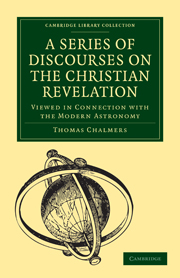Book contents
- Frontmatter
- PREFACE
- Contents
- DISCOURSE I A SKETCH OF THE MODERN ASTRONOMY
- DISCOURSE II THE MODESTY OF TRUE SCIENCE
- DISCOURSE III ON THE EXTENT OF THE DIVINE CONDESCENSION
- DISCOURSE IV ON THE KNOWLEDGE OF MAN'S MORAL HISTORY IN THE DISTANT PLACES OF CREATION
- DISCOURSE V ON THE SYMPATHY THAT IS FELT FOR MAN IN THE DISTANT PLACES OF CREATION
- DISCOURSE VI ON THE CONTEST FOR AN ASCENDENCY OVER MAN, AMONGST THE HIGHER ORDERS OF INTELLIGENCE
- DISCOURSE VII ON THE SLENDER INFLUENCE OF MERE TASTE AND SENSIBILITY, IN MATTERS OF RELIGION
- APPENDIX
DISCOURSE VII - ON THE SLENDER INFLUENCE OF MERE TASTE AND SENSIBILITY, IN MATTERS OF RELIGION
Published online by Cambridge University Press: 29 August 2010
- Frontmatter
- PREFACE
- Contents
- DISCOURSE I A SKETCH OF THE MODERN ASTRONOMY
- DISCOURSE II THE MODESTY OF TRUE SCIENCE
- DISCOURSE III ON THE EXTENT OF THE DIVINE CONDESCENSION
- DISCOURSE IV ON THE KNOWLEDGE OF MAN'S MORAL HISTORY IN THE DISTANT PLACES OF CREATION
- DISCOURSE V ON THE SYMPATHY THAT IS FELT FOR MAN IN THE DISTANT PLACES OF CREATION
- DISCOURSE VI ON THE CONTEST FOR AN ASCENDENCY OVER MAN, AMONGST THE HIGHER ORDERS OF INTELLIGENCE
- DISCOURSE VII ON THE SLENDER INFLUENCE OF MERE TASTE AND SENSIBILITY, IN MATTERS OF RELIGION
- APPENDIX
Summary
“And, lo! thou art unto them as a very lovely song of one that hath a pleasant voice, and can play well on an instrument: for they hear thy words, but they do them not.”
Ezekiel. xxxiii. 32.You easily understand how a taste for music is one thing, and a real submission to the influence of religion is another—how the ear may be regaled by the melody of sound, and the heart may utterly refuse the proper impression of the sense that is conveyed by it—how the sons and daughters of the world may, with their every affection devoted to its perishable vanities, inhale all the delights of enthusiasm, as they sit in crowded assemblage around the deep and solemn oratorio—aye, and whether it be the humility of penitential feeling, or the rapture of grateful acknowledgement, or the sublime of a contemplative piety, or the aspiration of pure and of holy purposes, which breathes throughout the words of the performance, and gives to it all the spirit and all the expression by which it is pervaded; it is a very possible thing, that the moral, and the rational, and the active man, may have given no entrance into his bosom for any of these sentiments; and yet so overpowered may he be by the charm of the vocal conveyance through which they are addressed to him, that he may be made to feel with such an emotion, and to weep with such a tenderness, and to kindle with such a transport, and to glow with such an elevation, as may one and all cany upon them the semblance of sacredness.
- Type
- Chapter
- Information
- A Series of Discourses on the Christian Revelation, Viewed in Connection with the Modern Astronomy , pp. 216 - 256Publisher: Cambridge University PressPrint publication year: 2009First published in: 1817



